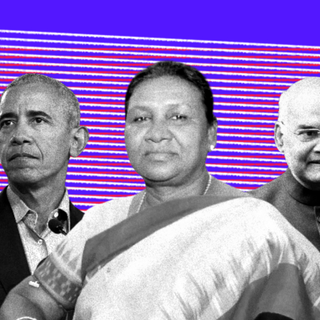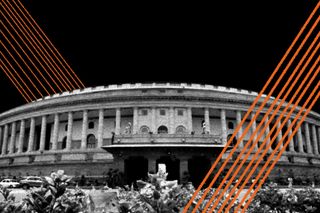
‘Sexual Harassment’ Is Listed as an Unparliamentary Term, Eroding Accountability
The Centre this week released a new list of Unparliamentary words ahead of the monsoon session — leading to sexual harassment being left without a vocabulary to articulate it in lawmaking spaces.

Ahead of the monsoon session of the parliament due to begin on 18th July, Monday, the Lok Sabha Secretariat released a new booklet enumerating a list of words deemed to be “unparliamentary language.” The document contains a long list of words and phrases set to be seen as indecent and unbecomingof an elected leader’s language in the Lok Sabha and Rajya Sabha from the new session. Included in the list, among a haul of commonplace words now declared unparliamentary, is the term “sexual harassment.”
The list changes the intent of rules pertaining to elected officials’ speeches. Where they were meant to curb inflammatory words and conduct, the new list ensures that several words — such as “corrupt”, “hooliganism”, “hypocrisy”, “criminal”, “untrue” etc. — that are important for the electorate are disallowed. This leads to a situation where even something as crucial as sexual harassment is left without a vocabulary to articulate it in lawmaking spaces.
In India, legally, a Member of Parliament (MP) is immune from arrest for their speech in the House. However, a parliamentarian’s words are subject to multiple checks on speech that may be considered indecent, defamatory, or undignified. These checks include the Rules of Procedure of Business and Conduct in Lok Sabha, which state that “If the Speaker is of opinion that words have been used in debate which are defamatory or indecent or unparliamentary or undignified, the Speaker may, while exercising discretion order that such words be expunged from the proceedings of the House.” Further, “The portion of the proceedings of the House so expunged shall be marked by asterisks and an explanatory footnote shall be inserted in the proceedings as follows: ‘Expunged as ordered by the Chair’.”
The inclusion of the term “sexual harassment” in this list indicates that discussion of sexual offences in the parliament is undesirable. It is an effort by the powers that be to shrug off their responsibility towards ensuring justice to survivors of sexual abuse and assault, and simultaneously also a refusal of the parliament to address a systemic problem that runs even inside the institution.
The implications of excluding this vocabulary become starker upon scrutinizing the people in Parliament themselves. In 2019, soon after the results of the elections to the current Lok Sabha were declared, the Association of Democratic Reforms took out a report on the criminal record of the new parliament. The report mentioned that 40% of the new MPs faced criminal charges, including rape charges. A year later, The New Indian Express reported that 76 MPs and MLAs across the country faced cases related to crimes against women. Just last year, a woman who accused a former junior minister of sexual harassment faced a criminal defamation case in court.
Related on TheSwaddle:
Many Cases of Sexual Harassment Never Make it to Companies’ Internal Committees
The decision to make “sexual harassment” a taboo term for parliament has parallels in the other branches of the government, including the judiciary, and is symptomatic of the discomfort of Indians in discussing gender-based violence and, consequentially, reform. In May this year, a two-judge bench in the Delhi High Court delivered a split judgement on the question of criminalizing marital rape. Section 375 of the Indian Penal Code, that deals with rape, includes an exception stating that forceful intercourse by a man with his own wife will not amount to rape. The fact that Justice C Hari Shankar, one of the two judges on the bench, felt that taking away this exception will negate and threaten the sanctity of the institution of marriage itself says a lot about the premise on which the foundations of the institution lie. In other recent judgements, courts have also remarked that it was unnatural for a father-in-law to rape his daughter-in-law, and have directed rapists to marry their victims instead of sentencing them to prison.
These are only a few in a long line of such cases in India’s judicial history that show how the Indian approach to address sexual crimes against women has never been to confront this issue directly to institute necessary reforms. Instead, the noticeable pattern has been to question whether women having autonomy over their own bodies is worth eroding our culture that thrives in their oppression. If the well-being of a substantial portion of the populace is threatened by violence and outdated laws, then one would want to assume that the more sensible thing to do would be to examine them through discussion and debate. Instead, the list of words and much of our judicial precedent shows how our courts and legislators discourage even the bare minimum acknowledgement of reality.
Discouraging the mention of “sexual harassment” in the parliament and state legislatures will not automatically reduce its incidence in society. The mention of “sexual harassment” makes the parliament uncomfortable, but that discomfort should not be directed to a mention of the crime. Reportage or survivors’ testimonies should not outrage the modesty of the society more than the actual abuse and harassment. Deeming the phrase unparliamentary enables its invisibilization and normalization, and prevents possible meaningful legislations on the issue. The implications of this are clear: that shrinking the language available to articulate the harm that citizens face ensures that the people they elect not only fail in their duties, but also escape accountability themselves.
Amlan Sarkar is a staff writer at TheSwaddle. He writes about the intersection between pop culture and politics. You can reach him on Instagram @amlansarkr.
Related


In Conversation: On Angry Lions and Nationalism
